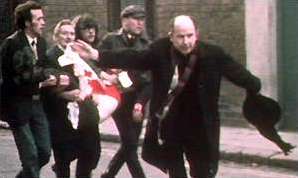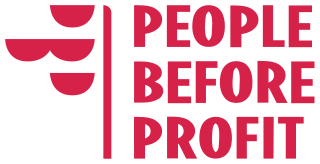Related Research Articles

Bloody Sunday, or the Bogside Massacre, was a massacre on 30 January 1972 when British soldiers shot 26 unarmed civilians during a protest march in the Bogside area of Derry, Northern Ireland. Thirteen men were killed outright and the death of another man four months later was attributed to gunshot injuries from the incident. Many of the victims were shot while fleeing from the soldiers, and some were shot while trying to help the wounded. Other protesters were injured by shrapnel, rubber bullets, or batons; two were run down by British Army vehicles; and some were beaten. All of those shot were Catholics. The march had been organised by the Northern Ireland Civil Rights Association (NICRA) to protest against internment without trial. The soldiers were from the 1st Battalion of the Parachute Regiment, the same battalion implicated in the Ballymurphy massacre several months before.

Derry, officially Londonderry, is the largest city in County Londonderry, the second-largest in Northern Ireland and the fifth-largest on the island of Ireland. The old walled city lies on the west bank of the River Foyle, which is spanned by two road bridges and one footbridge. The city now covers both banks.

The Troubles were an ethno-nationalist conflict in Northern Ireland that lasted for about 30 years from the late 1960s to 1998. Also known internationally as the Northern Ireland conflict, it is sometimes described as an "irregular war" or "low-level war". The conflict began in the late 1960s and is usually deemed to have ended with the Good Friday Agreement of 1998. Although the Troubles mostly took place in Northern Ireland, at times violence spilled over into parts of the Republic of Ireland, England, and mainland Europe.

John Hume was an Irish nationalist politician in Northern Ireland and a Nobel Peace Prize laureate. A founder and leader of the Social Democratic and Labour Party, Hume served in the Northern Ireland Parliament; the Northern Ireland Assembly including, in 1974, its first power-sharing executive; the European Parliament and the United Kingdom Parliament. Seeking an accommodation between Irish nationalism and Ulster unionism, and soliciting American support, he was both critical of British government policy in Northern Ireland and opposed to the republican embrace of "armed struggle". In their 1998 citation, the Norwegian Nobel Committee recognised Hume as an architect of the Good Friday Agreement. For himself, Hume wished to be remembered as having been, in his earlier years, a pioneer of the credit union movement.

Josephine Bernadette McAliskey, usually known as Bernadette Devlin or Bernadette McAliskey, is an Irish civil rights leader and former politician. She served as Member of Parliament (MP) for Mid Ulster in Northern Ireland from 1969 to 1974. McAliskey came to national and international prominence at the age of 21 when she became the youngest person ever to become a member of the British Parliament. McAliskey broke the traditional Irish republican policy of abstentionism and took her seat in Westminister. McAliskey's ascension came at the outbreak of the Troubles, an ethno-nationalist conflict which would come to dominate Northern Ireland for the next 30 years. For the majority of that time, McAliskey would be politically active, advocating for a 32-county socialist Irish republic to replace the two states on the island of Ireland. Originally linked to the People's Democracy group, McAliskey was later a founder of the Irish Republican Socialist Party. However, McAliskey left the party after a year when members voted that its paramilitary wing, the Irish National Liberation Army, did not have to obey the political wing.

Free Derry was a self-declared autonomous Irish nationalist area of Derry, Northern Ireland that existed between 1969 and 1972 during the Troubles. It emerged during the Northern Ireland civil rights movement, which sought to end discrimination against the Irish Catholic/nationalist minority by the Protestant/unionist government. The civil rights movement highlighted the sectarianism and police brutality of the overwhelmingly Protestant police force, the Royal Ulster Constabulary (RUC).

The Battle of the Bogside was a large three-day riot that took place from 12 to 14 August 1969 in Derry, Northern Ireland. Thousands of Catholic/Irish nationalist residents of the Bogside district, organised under the Derry Citizens' Defence Association, clashed with the Royal Ulster Constabulary (RUC) and loyalists. It sparked widespread violence elsewhere in Northern Ireland, led to the deployment of British troops, and is often seen as the beginning of the thirty-year conflict known as the Troubles.
The Northern Ireland Civil Rights Association (NICRA) (Irish: Cumann Cearta Sibhialta Thuaisceart Éireann) was an organisation that campaigned for civil rights in Northern Ireland during the late 1960s and early 1970s. Formed in Belfast on 9 April 1967, the civil rights campaign attempted to achieve reform by publicising, documenting, and lobbying for an end to discrimination against Catholics in areas such as elections (which were subject to gerrymandering and property requirements), discrimination in employment, in public housing and abuses of the Special Powers Act.
Ivan Averill Cooper was a nationalist politician from Northern Ireland. He was a member of the Parliament of Northern Ireland and a founding member of the Social Democratic and Labour Party (SDLP). He is best known for leading the civil rights march on 30 January 1972 that developed into the Bloody Sunday massacre.

Eamonn McCann is an Irish political activist, former politician and journalist from Derry, Northern Ireland. McCann was a People Before Profit (PBP) Member of the Legislative Assembly (MLA) for Foyle from 2016 to 2017. In 2019, he was elected to Derry City and Strabane District Council, remaining in the position until his resignation for health reasons in March 2021.

The Dublin Housing Action Committee (DHAC) was a 1960s protest group formed in response to housing shortages in Dublin, Ireland's capital city. It quickly moved to direct action and successfully squatted buildings to oppose redevelopment plans.
The Derry Housing Action Committee (DHAC), was an organisation formed in 1968 in Derry, Northern Ireland to protest about housing conditions and provision.

Raymond McCartney is an Irish former Sinn Féin politician, and a former hunger striker and volunteer of the Provisional Irish Republican Army (IRA).

People Before Profit is a Trotskyist political party formed in October 2005. The party is active in the Republic of Ireland and Northern Ireland.
Cyril Toman was a political activist in Northern Ireland.
Marian Donnelly is a former president of the Workers' Party and was a member of the former District Policing Partnership for the Magherafelt district of Northern Ireland.
The city of Derry, Northern Ireland, was severely affected by the Troubles. The conflict is widely considered to have begun in the city, with many regarding the Battle of the Bogside in 1969 as the beginning of the Troubles. The Bloody Sunday incident of 1972 occurred in Derry, in the Bogside area.
Claude Wilton was a politician, solicitor and civil rights campaigner from Northern Ireland.

Colum Eastwood is an Irish nationalist politician who has served as Leader of the Social Democratic and Labour Party (SDLP) since 2015. He has served as the Member of Parliament (MP) for Foyle since 2019, served in Northern Ireland Assembly from 2011 to 2019 and served on Derry City Council from 2005 to 2011.
The Northern Ireland civil rights movement dates to the early 1960s, when a number of initiatives emerged in Northern Ireland which challenged the inequality and discrimination against ethnic Irish Catholics that was perpetrated by the Ulster Protestant establishment. The Campaign for Social Justice (CSJ) was founded by Conn McCluskey and his wife, Patricia. Conn was a doctor, and Patricia was a social worker who had worked in Glasgow for a period, and who had a background in housing activism. Both were involved in the Homeless Citizens League, an organisation founded after Catholic women occupied disused social housing. The HCL evolved into the CSJ, focusing on lobbying, research and publicising discrimination. The campaign for Derry University was another mid-1960s campaign.
References
- ↑ "Irish Civil Rights". Irish Anti-Partition League. Archived from the original on 16 April 2018. Retrieved 8 September 2022.
- ↑ Hastings, Max (1970). Barricades in Belfast: the fight for civil rights in Northern Ireland. Taplinger Publishing. p. 47. ISBN 978-0-8008-0665-1.
- ↑ Stout, Angela Kathryn; Richard Alan Dello Buono; William J. Chambliss (2004). Social problems, law, and society. Rowman & Littlefield. p. 352. ISBN 978-0-7425-4207-5.
- ↑ McMahon, Seán (1997). A short history of Ireland . Dufour Editions. p. 200. ISBN 978-0-8023-1319-5.
- ↑ Bloody Sunday Report (Volume 5, Chapter 86) Archived 3 November 2010 at the UK Government Web Archive Volume 5, Chapter 86.
- ↑ Presentation to Eamonn Melaugh, Annual Northern Ireland regional conference of the Workers Party, Belfast (4 October 2008), youtube.com.
- ↑ Foyle Elections 1983-1992, ark.ac.uk; accessed 30 January 2018.
- ↑ Foyle Elections 1973-83 Eamonn Melaugh Electoral history], electionsireland.org; accessed 30 January 2018.
- ↑ Eamonn Melaugh Archived 22 January 2011 at the Wayback Machine , eaawsecohumanitarians.org; accessed 30 January 2018.
- ↑ "If the state had treated people equally, none of this would have happened". Spiked. 14 August 2019. Retrieved 7 December 2020.